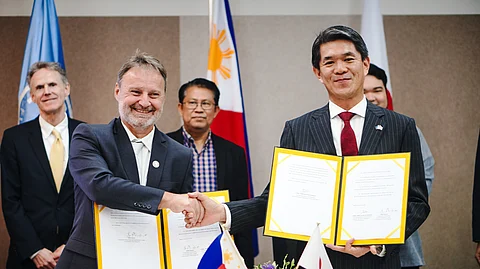
- NEWS
- the EDIT
- COMMENTARY
- BUSINESS
- LIFE
- SHOW
- ACTION
- GLOBAL GOALS
- SNAPS
- DYARYO TIRADA
- MORE

The Government of Japan is continuing its support for the Philippines' local agriculture sector with a new project in the Bangsamoro Autonomous Region in Muslim Mindanao (BARMM).
The Food and Agriculture Organization of the United Nations (FAO) will implement the "Development of Sustainable Fishery Value Chains in BARMM" in partnership with the Ministry of Agriculture, Fisheries and Agrarian Reform (MAFAR).
The project, which has received a USD 4.79 million grant from the Japanese government, aims to enhance livelihoods, strengthen resilience, and ensure food security in BARMM through sustainable aquaculture and fisheries.
The Bangsamoro region, once marred by violence and rebellion, continues to develop its aquaculture and fisheries industry with strong backing from the government’s commitment to its progress.
BARMM has consistently topped national fisheries production charts with the strong support of the local government and the Ministry of Agriculture, Fisheries and Agrarian Reform (MAFAR). The region supplies roughly 30 percent of the country’s total fish production, making it a valuable economic zone. However, high post-harvest losses, declining production, underutilized waters, and high poverty rates continue to threaten BARMM’s growth in the sector.
As part of FAO’s Blue Transformation Roadmap, the project aims to meet the rising demand for aquatic food while reducing aquaculture’s environmental footprint. It will provide technical support, training, and capacity-building, as well as build necessary infrastructure to improve market linkages and the value chain of local aquatic foods, empowering fishing communities in BARMM. Similarly, MAFAR and local government units will undergo capacity-building to improve fish stock monitoring and management.
The project will also focus on entrepreneurship and alternative livelihoods for small-scale fishing communities, including fish processing. Resilient aquaculture and fishing technologies, especially in post-harvest processing, will be introduced to reduce losses and ensure the sustainability of the project.
Ambassador ENDO Kazuya reaffirmed the Government of Japan’s steadfast commitment to supporting peace and development in BARMM.
“Japan remains deeply committed to advancing peace and promoting inclusiveness in its engagement in BARMM. Empowering communities on the ground is key to driving meaningful development, stability and growth,” he said.
He underscored the significance of collaborations, such as the partnership with FAO, in driving these efforts forward. Highlighting the critical role of the fishery sector, he emphasized that empowering the sector is not only essential but also a strategic investment for the region.
“With FAO’s expertise and experience in similar initiatives,and the cooperation of all relevant stakeholders, I am confident that our collective efforts will ensure the success of this new project,” he added.
MAFAR recognized the timeliness of the project, which is set to benefit 4,000 small-scale aquafarmers and fishers in BARMM, including women and former rebel combatants from the two former rebel camps that are part of the project sites.
“We believe that this partnership will pave the way for a more sustainable, inclusive, and a stronger fisheries sector that uplifts the Bangsamoro people and contributes to the nation’s food security,” said MAFAR Minister Mohammad Yacob.
FAO Representative in the Philippines Lionel Dabbadie highlighted how the new project builds on the success of past FAO initiatives supported by the Government of Japan.
“From restoring and rehabilitating livelihoods affected by the onslaught of Super Typhoon Haiyan (local name Yolanda) and Typhoon Rai (local name Odette), to prioritizing agricultural development for peace — the Government of Japan has long been an impactful partner of FAO in our work with the Philippine Government — continuously building robust agrifood systems and making nutritious food accessible to all,” said Dr. Dabbadie.
“In addition to directly supporting the Bangsamoro peace process and economic development, our goal is also to position BARMM as a leading example of modern, transformative, and innovative sustainable development — one that inspires and guides other regions around the world,” he added.
